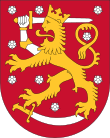
Back سياسة فنلندا Arabic Държавно устройство на Финландия Bulgarian Finlands politik Danish Suomen poliittinen järjestelmä Finnish Politique en Finlande French Politica della Finlandia Italian フィンランドの政治 Japanese ფინეთის პოლიტიკური სისტემა Georgian 핀란드의 정치 Korean Ustrój polityczny Finlandii Polish
Politics of the Republic of Finland | |
|---|---|
 | |
| Polity type | Unitary parliamentary republic |
| Constitution | Constitution of Finland |
| Legislative branch | |
| Name | Eduskunta/Riksdagen |
| Type | Unicameralism |
| Meeting place | Parliament House |
| Presiding officer | Jussi Halla-aho, Speaker of the Parliament |
| Executive branch | |
| Head of State | |
| Title | President |
| Currently | Alexander Stubb |
| Appointer | Popular vote |
| Head of Government | |
| Title | Prime Minister |
| Currently | Petteri Orpo |
| Appointer | President |
| Cabinet | |
| Name | Finnish Government |
| Current cabinet | Orpo Cabinet |
| Leader | Prime Minister |
| Appointer | President |
| Headquarters | Government Palace |
| Ministries | 12 |
| Judicial branch | |
| Name | Judicial system of Finland |
| Courts | General Courts |
 |
|---|
The politics of Finland take place within the framework of a parliamentary representative democracy. Finland is a republic whose head of state is President Alexander Stubb, who leads the nation's foreign policy and is the supreme commander of the Finnish Defence Forces.[1] Finland's head of government is Prime Minister Petteri Orpo, who leads the nation's executive branch, called the Finnish Government.[2] Legislative power is vested in the Parliament of Finland (Finnish: Suomen eduskunta, Swedish: Finlands riksdag),[3] and the Government has limited rights to amend or extend legislation. The Constitution of Finland vests power to both the President and Government: the President has veto power over parliamentary decisions, although this power can be overruled by a majority vote in the Parliament.[4]
The judiciary is independent of the executive and legislative branches. The judiciary consists of two systems: regular courts and administrative courts. The judiciary's two systems are headed by the Supreme Court and the Supreme Administrative Court, respectively. Administrative courts process cases in which official decisions are contested. There is no constitutional court in Finland: the constitutionality of a law can be contested only as applied to an individual court case.
The citizens of Finland enjoy many individual and political freedoms, and suffrage is universal at the age of 18; Finnish women became the first in the world to have unrestricted rights both to vote and to run for public office.
The country's population is ethnically homogeneous with no sizable immigrant population. Few tensions exist between the Finnish-speaking majority and the Swedish-speaking minority, although in certain circles there is an unending debate about the status of the Swedish language.[clarification needed]
Finland's labor agreements are based on collective bargaining. Bargaining is highly centralized, and often the government participates to coordinate fiscal policy. Finland has universal validity of collective labour agreements and often, but not always, the trade unions, employers, and the Government reach a national income policy agreement. Significant Finnish trade unions include SAK, STTK, AKAVA, and EK.[5]
The Economist Intelligence Unit rated Finland a "full democracy" in 2022.[6] According to the V-Dem Democracy indices Finland was 2023 the 13th most electoral democratic country in the world.[7]
- ^ "Position and duties - The President of the Republic of Finland: Position and Duties". tpk.fi. Retrieved 21 March 2018.
- ^ "Role of the Prime Minister". Valtioneuvosto. Retrieved 21 March 2018.
- ^ "About Parliament". Parliament of Finland. Archived from the original on 3 August 2018. Retrieved 21 March 2018.
- ^ "Duties". The President of the Republic of Finland. Archived from the original on 22 March 2018. Retrieved 21 March 2018.
- ^ "Finnish Trade Unions: Structure, purpose, and which one to join". Expat Finland. Archived from the original on 22 March 2018. Retrieved 21 March 2018.
- ^ "Democracy Index 2022: Frontline democracy and the battle for Ukraine" (PDF). Economist Intelligence Unit. 2023. Retrieved 9 February 2023.
- ^ V-Dem Institute (2023). "The V-Dem Dataset". Retrieved 14 October 2023.
© MMXXIII Rich X Search. We shall prevail. All rights reserved. Rich X Search